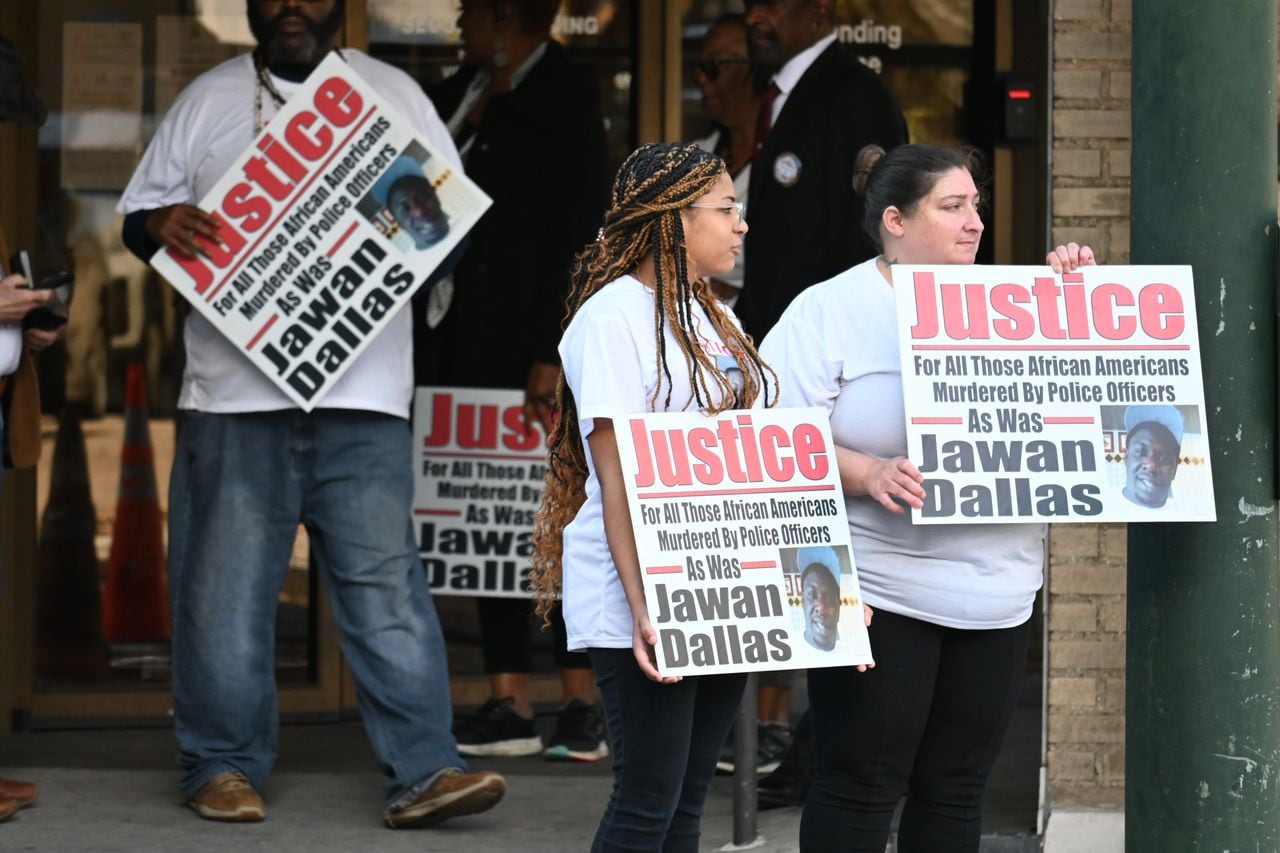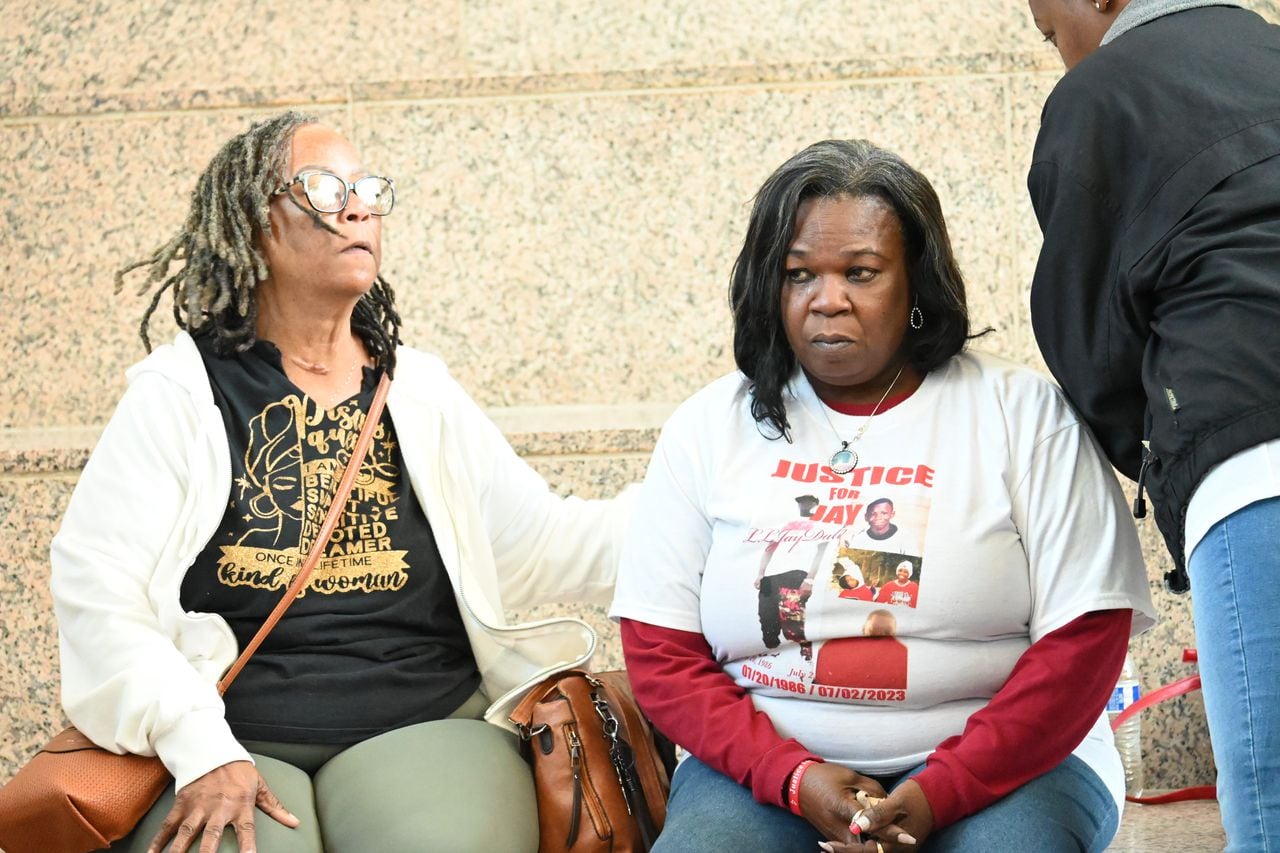âI do not want to be George Floydâ: Jawan Dallas family blasts Mobile police after seeing video
Jawan “Jay” Dallas was “murdered” by Mobile police on July 2, after he was repeatedly struck with a Taser during an encounter that is on par with the George Floyd killing by a Minneapolis police officer in 2020, an attorney for the Dallas family and the father of the 36-year-old said Wednesday.
“This is one of the worst videos of a police killing that I have ever witnessed,” said Atlanta-based civil rights attorney Harry Daniels. “We know he begged for his life. He was saying and screaming, ‘I cannot breathe.’ He said, ‘I do not want to be George Floyd.’”
Phil Williams, the father of Jawan Dallas, added, “This is one of the worst days of my life. Mobile Police Department, you straight murdered my son. You were not there to serve and protect him, you were there to destroy. You killed him.”
The blistering comments came during an emotional news conference at Mobile’s Government Plaza after family members and their lawyers reviewed two separate police-worn body camera footage for the first time. The footage on each camera worn by the two police officers who encountered Dallas, lasted a little more than 40 minutes each, Daniels said. The names of the officers have not been released.
Mobile Mayor Sandy Stimpson, in a statement later in the afternoon, said the body cam footage was “only one piece of all the evidence” presented to the grand jury during the investigation. The mayor, in his statement, said the cause of Dallas’ death was due to health factors and drug use.
“The loss of a son is tragic under any circumstances,” Stimpson said. “The Dallas family and their representatives met with members of the administration earlier today to view the body camera footage related to this case. While the loss of life is never the intended outcome of any interaction with the Mobile Police Department, the cause of death in this case was clearly due to cardiorespiratory failure and mixed drug intoxication. The family has a right to their interpretation of the video, however the video is only one piece of all the evidence presented to the grand jury. There are still ongoing investigations and expected civil action. For those reasons and out of respect for the family, we won’t be making any additional comments at this time.”
The grand jury investigation was completed last week with no charges filed against the police officers.
“The citizens of Mobile County who participate in the grand jury process have an enormous responsibility,” Blackwood said in a statement. “They are sworn in by a judge and take an oath to seek the truth. The decision a grand jury makes on whether or not to indict is extremely difficult. While we sympathize with the Dallas family for their loss, 18 people reviewed the facts presented and found there was no criminal liability.”
The family’s review of the body cam footage capped their 4-1/2-month journey as they repeatedly requested an opportunity to watch it, only to be told they could not because it was considered evidence in an ongoing investigation before a grand jury. Authorities have not released the video to the media.
“We fought for months to see a video we should have seen the next day,” Williams said.
Different takes
Christine Dallas (right) is consulted ahead of a news conference on Wednesday, Nov. 22, 2023, at Government Plaza in Mobile, Ala. The conference was held after the attorney and family members of Jawan Dallas — including Christine, Jawan’s mother — reviewed the footage of the police-worn body camera taken on July 2, 2023, when Dallas died following an altercation with police.John Sharp/[email protected]
The statements about the circumstances and cause of Dallas’ death appear to be in complete contradiction between the Dallas family and authorities.
The contradictions prompted Daniels to call on the city to release the body cam footage, which is not required under Alabama state law.
“The narrative I’m giving is different from what they are giving,” Daniels said. “Who do you believe? Who is telling the truth? The one thing that clears it up is to show the video. It’s what should be considered and gives more transparency for police officers and makes the community safe.”
Blackwood, in a news conference last week, announced that a grand jury had cleared the police officers of any wrongdoing after saying an autopsy report showed that Dallas died from “underlying medical conditions,” and not Tasing.
Blackwood also said that Dallas “initiated” a struggle with police, which Daniels called a “damned lie.”
“That’s not true,” Daniels said. “They initiated him. They unlawfully initiated him. They demanded his identification with no suspicion of his crime. Jawan didn’t have to give (the police officers) anything. They are incompetent police officers. The reason Jawan Dallas is dead today is became of them. It doesn’t matter what an autopsy report (say).”
A toxicology report, which Blackwood announced last week, showed two different drugs in Dallas’ system at the time of the incident; mojo, a synthetic cannabinoid, and some sort of amphetamine.
Daniels said that throughout the body cam video, Dallas appeared to be coherent.
Violent encounter

A press conference was held on Wednesday, Nov. 22, 2023, at Government Plaza in Mobile, Ala., after the attorney and family members of Jawan Dallas reviewed the footage of the police-worn body camera that showed a deadly police altercation with the 36-year-old Mobile man.John Sharp/[email protected]
Daniels, on Wednesday, said the body cam footage shows that Dallas was tased more than twice, which is what police initially claimed. He also said Dallas was tackled to the ground by police before they tased him.
“We heard almost 13 cycles,” said Daniels. “We don’t know if those cycles struck his body, but it 13 times. It sounds like someone was getting electrocuted in an electric chair. It was continuous.”
Daniels said one of the officers can be heard saying, ‘shut the f—k up” multiple times as Dallas was on the ground and shouting, “I can’t breathe,” the same last words shouted by Eric Garner – a Black man who was killed in 2014 after being placed in a chokehold by a New York City Police Officer.
A number of Black men, including Floyd, have said the same phrase before dying during their encounters with police.
Floyd’s killing while in police custody on a Minneapolis street was caught on video and ignited protests across the country over police brutality and racial injustice. Derek Chauvin, the white police officer convicted of killing Floyd, is serving a 21-year prison sentence.
There is no known cell phone video of Dallas’ encounter with police.
“He’s begging for help,” Daniels said of Dallas in the body cam video footage. “The portion of the video that you can see, he’s not grabbing for anything. (The police officers) told him to roll over and he said he can’t breathe. He was on his back. That’s when he said that ‘I have asthmas and I can’t breathe.’”
The Jawan Dallas encounter, according to authorities, occurred as the police officers were investigating a burglary report within the area. Daniels said the investigation wasn’t about a burglary, but was “at best, a trespass.”
Daniels said that authorities approached Dallas, who was inside a vehicle, because he was Black. Daniels said there was no indication at the time that Dallas was involved in trespassing.
“He said, ‘I don’t know anything’ and ‘what are you talking about?’” Daniels said, reiterating what he said is on the body cam video. “Jawan Dallas was innocent. He was not involved in anything. He was in the wrong place at the wrong time and with reckless-ass officers who were on the scene.”
Dallas’ searched for his identification began the escalating of the encounter, Daniels said. But Daniels also said there was not “shifting” of Dallas in the car that might be considered threatening to police, adding that Dallas got out of the car and also attempted to flee the scene.
“We have witnesses who were there,” Daniels said. “They are on the video and telling (police officers) to stop tasing him. It’s on the video. We were told early on what happened through eyewitness accounts. (The video footage) is 100 times worse. I can see why the City of Mobile doesn’t want to release this video. It’s really bad.”
‘We have a problem’
The review of the body cam footage comes at a time of rising tensions in Mobile over deadly or violent encounters with police. The more recent encounter occurred on Nov. 13, following a police raid in which a 16-year-old teenage boy was shot and killed by police. The teenager was not the intended target of the raid, prompting Mobile Mayor Sandy Stimpson to immediately order most pre-dawn raids be suspended.
Robert Clopton, president of the Mobile chapter of the NAACP, urged Mobile to be “better than this,” noting there has been more than one police raid within the past year in which the wrong person was approached and shot to death.
“Mobile, we have a problem,” said Clopton, who did not review the body cam footage of Dallas’ encounter with police. “We have to solve this problem. We have to get not only justice for Jay, but the three other men.”
The three other Black men who have died following encounters with Mobile police this year include:
- Kordell Jones, 25, as shot by authorities on March 7 as he ran out of a house naked and carrying an AR-style gun while police were raiding a home in search of his brother.
- Christopher Jones, 24, was shot and killed October 2 on Glenwood Street during an altercation with police while he was on the roof of a residence. Officers ordered Jones to come down from the roof, and he complied, only to produce a shotgun and point it at police. Jones was shot and killed.
- The 16-year-old who was shot and killed as Mobile police were searching a home for a relative.
“If we need to take (the investigation) back to Michael Moore, then we need to,” said Clopton, referring to the Black teenager who was shot and killed by a white police officer in 2016, during a traffic stop. While the officer, Harold Hurst was cleared of any wrongdoing, a civil matter proceeded. According to an attorney in a statement to WPMI-TV in 2021, the wrongful death lawsuit was settled for $2.5 million.
Daniels said he plans to file a civil lawsuit against the city on behalf of the Dallas family.
“We’ll stay in your face,” said Williams, the father. “We want justice for Jay. We are going all in for Jay because know Jay would go all in for us. Jay didn’t deserve to die like that.”
This story was updated at 3:11 p.m. with comments from Mobile Mayor Sandy Stimpson and Mobile County District Attorney Keith Blackwood.
